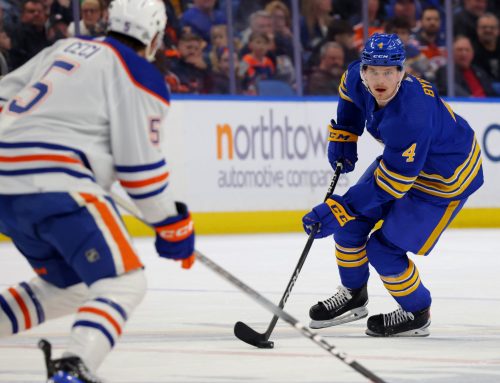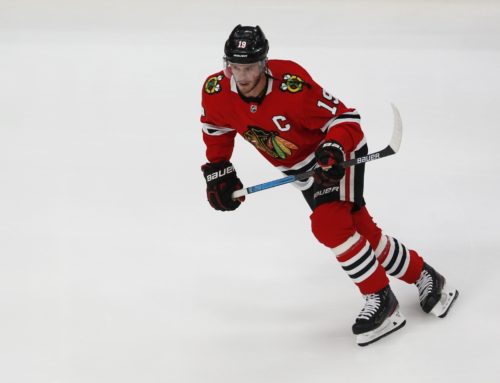
Merry Christmas everyone! With no games to run down, my gift to you is 25 stats to consider in your fantasy league:
1. 4:14 – That’s the number of power play minutes Mikko Rantanen has averaged per game, leading the entire league. Somehow, the sophomore is only at 50% ownership on Yahoo despite this tremendous opportunity that includes exposure to Nathan MacKinnon at even strength and on the PP. It isn’t as though Rantanen has failed to produce either, as he has 31 points in 35 games including 14 power-play points. The former lottery pick is legit and should be at or near universal ownership. The top line with Rantanen, MacKinnon and Gabriel Landeskog has been one of the league’s best since being put together, don’t sleep on them.
2. 19 – Josh Bailey’s league-leading total of secondary assists, helping him to a tie with Jakub Voracek for the lead in totals assists with 36. Voracek has only seen 13 of his 36 as the secondary type, demonstrating a greater involvement in driving offense. We shouldn’t diminish what Bailey has done too much, but there is little question that he has overachieved skating alongside John Tavares and Anders Lee. There is no questioning the skill and chemistry on this line, but Bailey has typically scored on 60-65% of the goals with him on the ice. This season, his IPP is at 79%. With his usual luck in terms of secondary assists Bailey would have closer to 37 points than his 46 thus far. Those points are banked, but don’t be shocked if the bubble bursts here in the second half.
It’s no leap to suggest that you should sell high on Bailey, but that’s always relative to what you can net in return. Be prepared to simply ride it out with Bailey even if you should only expect ~35 points the rest of the way. For those who aren’t doing the math that would still leave Bailey with ~81 points thanks to the points already banked. That would be a wildly successful season.
3. 38.1% – Mike Green’s primary point percentage, the lowest in the league among players with at least 20 points (Green has 21). This isn’t necessarily an indictment of Green as we expect defensemen to pile up secondary assists. However, since Green is teetering on the edge of fantasy relevance this isn’t necessarily a good omen, especially as the Red Wings’ offense has taken a step backward.
4. 42.3% – Right behind Green on the primary point percentage list is Henrik Sedin, which is much more alarming. The Sedins have seen a resurgence thanks to the emergence of Brock Boeser, and an increase in power play usage. Henrik has always been a particularly assist-heavy player, but relying on secondary assists for over half of his points is not a sustainable strategy. Even if Brock Boeser continues to score at an elite rate the Sedins aren’t always skating with the rookie at even strength to bank on a continuous flood of goals. The puck will be spread out enough on the power play that Sedin won’t continue to be so fortunate.
Another forward with over half of his points coming from secondary assists: Mitch Marner. Not great!
5. 96.0% – James van Riemsdyk’s league-leading primary point percentage (among players with 20 points or more). Just one of his 25 points has been a secondary assist. This makes sense as he is primarily a net-front option, but this is an extreme rate. Last season, a quarter of his 62 points were secondary assists. It is true that the line with Marner, van Riemsdyk and Tyler Bozak has taken a big step back, but even with that considered van Riemsdyk is leaving some meat on the bone.
Other forwards with at least 90% of their scoring coming from primary points: Brian Gibbons, Derick Brassard, Tyler Seguin, Michael Grabner, Brendan Gallagher, Bo Horvat.
6. 22:31 – Aleksander Barkov’s average time on ice, tops among forwards. This is both promising and terrifying. I cannot imagine a player as injury prone as Barkov racking up this many miles and coming out unscathed.
7. 101 – Nikita Kucherov’s league-leading point total in the 2017 calendar year, comprising 78 games. Connor McDavid sits just behind at 100 points.
8. 64 – The number of power-play goals scored by the Lightning in the 2017 calendar year, tops in the league. Pittsburgh (63), Toronto (60), Washington (60), Boston (59), Winnipeg (59), Nashville (58) are the only other teams with more than 50 PPGs this year. No surprise that these have been some of the best teams for fantasy value.
9. 27 – Columbus’ league low for power-play goals in 2017. Technically, this title goes to Vegas (23), but considering the expansion team is half a season behind we’ll give them a pass. How sad is it that Columbus has a 50-game head start and only a four-goal lead?
Other teams with less than 40 PPGs this year: Anaheim (35), Chicago (38), Carolina (39). Columbus deservedly takes a lot of shit for their miserable power play, but how is it that a team with Patrick Kane has been so inept while up a man?
10. 0.812 – Scott Darling’s save percentage while shorthanded this season. His PK save percentage had floated around .900 in his previous two seasons, but has tanked with the normally stout penalty-killing Hurricanes. The only starters who have been worse than Darling are Jacob Markstrom and Cam Talbot. I’m buying low on two of these goalies.
11. 57 – The number of points Justin Williams has scored in the 2017 calendar year, as many as Alexander Radulov, Sasha Barkov, Kyle Turris, Max Pacioretty and Mark Stone. It is really hard to find under-the-radar talent any more, but he’s a great example.
12. 56 – Joe Pavelski’s point total in 78 games this year? He has been hurt and has picked up his scoring of late, but still represents the worst kind of under-performer: the kind you cannot drop. Kudos to those who have hung on and stayed in the running, Pavelski should be better in 2018.
13. 47 – Seth Jones’ point total in the 2017 calendar year. This eclipses Zach Werenski’s mark of 41. Both are studs and there is room for both to be relevant, but Jones is inching ahead as the top dog in Columbus. As teams trend towards the 4F-1D look there is often room for only one defenseman of significance. Jones has gained an upper-hand, which may come as a surprise.
14. 62 – Erik Karlsson’s point total this year, fourth among defensemen. An ankle injury notably cost him some games, but Karlsson has not had the outsized production that has pushed him far above his peers. Brent Burns (65), Victor Hedman (64), John Klingberg (62) and Nick Leddy (57) have all offered similar value at the shallowest skater position.
15. 335 – SOG for Evander Kane this calendar year, second only to Alexander Ovechkin (338). Better yet, Kane has scored on over 10% of those shots. No longer the king of the empty-calorie shot, Kane has been good in every format imaginable. The only question is if Kane can carry this over to his new team, assuming he is traded before the deadline.
16. 5.2% – The shooting percentage over the past year for the new king of the empty-calorie shot: Patrick Sharp.
Other contenders for the crown: Daniel Sedin, Derek Stepan, Boone Jenner, Derick Brassard, Patrice Bergeron. Father Time remains undefeated, but also, what is Jenner doing in here?
17. 6:23 – Tyler Johnson’s PP time in his last game. Johnson has already been on a tear since being bumped into the top six with points in nine straight games, but this becomes more sustainable if he can stick on the Lightning’s top PP unit. Johnson displaced Alex Killorn who has hardly taken advantage of his top unit usage with just seven PPP so far.
18. 16.3% – The highest jump in shooting percentage from last season to this season goes to William Karlsson whose breakout season didn’t come out of left field, it came out of parking lot four zip codes over. His 22.5% shooting is 10th among players with at least 20 games played. There’s little doubt that Karlsson has benefitted from an increase in ice time, and improved linemates, but players don’t typically improve their efficiency in greater minutes. Karlsson’s 16 goals, nearly match his total from the previous three seasons (18) in a third of the games. His shot rate has climbed from just over 1.0 per game to 2.0 per game.
Is it possible that with so few shots we didn’t see enough of a sample to determine Karlsson’s true shooting value during his time in Columbus and Anaheim?
19. 0.930 – John Gibson’s save percentage in the 2017 calendar year, tops among starting goaltenders. With the Ducks getting healthy, watch out for him in 2018. Rounding out the top five: Sergei Bobrovsky (0.926), Jonathan Quick (0.924), Andrei Vasilevskiy (0.924), Pekka Rinne (0.922).
20. 67 – The number of starts made by Frederik Andersen in 2017. No other starter made more appearances (not including playoffs). Not bad for a goalie who has struggled with injuries at times. Rounding out the top five: Cam Talbot (65), Mike Smith (64), Braden Holtby (64), Sergei Bobrovsky (62).
I cannot help but notice that the only overlap between the last two groups is Bobrovsky, the best goalie in fantasy hockey.
21. 59.4% – Pierre-Luc Dubois’ league-leading Corsi-For%, besting even noted stalwarts like Patrice Bergeron and Brad Marchand. Columbus has stumbled onto something great with Dubois, Artemi Panarin and Josh Anderson, as they boast the ability to tilt the ice at elite levels. Their goal-scoring still leaves something to be desired, but this trio is developing into a legitimate top line. I see plenty of potential for Dubois in the second half. Since getting jumped up the lineup he has 16 points in 25 games, a 53-point pace. Not bad for a rookie.
22. 22 – The number of penalties that Matthew Tkachuk has drawn this season, tops in the league. Other leaders in this stat: Mathew Barzal (20), Brad Marchand (20), Bryan Rust (19), Nico Hischier (18), Nikita Kucherov (18), Nazem Kadri (18), Johnny Gaudreau (17), Nikolaj Ehlers (17), David Pastrnak (17), Kevin Fiala (17).
I continue to believe that penalties drawn, or penalty differential, should be a fantasy stat. It’s trackable and unlike PIM, is actually a positive action. We want to reflect who the best players are, and penalties drawn is another means of doing so.
The best argument I’ve heard against this stat is that it favours the best players too heavily and that categories like hits, PIM and blocked shots are a better way to diversify the player pool. Penalty differential would be particularly taxing to the defenseman position that already struggles for relevance. However, defensemen who avoid taking penalties like Oscar Klefbom could gain value, which would be a net positive.
I also think that sometimes peripheral categories can skew things too far in the wrong direction. Play in a league with PIM and SOG and assist-heavy guys like Alexander Wennberg can be questionable options even when producing at a high rate. Add in FOW and centermen become overvalued. Add in blocked shots and defensemen have too much pull.
My longest-running league is in it’s 11th season. We started with Goals, Assists, PPP, Plus/Minus, PIM, and GWG as categories, but have since evolved to score Goals, Assists, Points, PPP, Plus/Minus, PIM, and SOG.
Game-Winners was an easy category to punt and Shots an easy category to add. We felt the need to bring on Points In lieu of Shutouts (as a fourth goalie category alongside Wins, Save% and GAA) because there was too much of a skew towards goalies. In this setup replacing PIM with penalty differential might be going too far, but I’d argue for simply dropping the points category and going to nine scoring categories. I also think that the category system pales in comparison to a points-based system, but that’s another can of worms.
23. 35 – Jack Roslovic’s AHL leading point total this season accrued in just 31 games. The 20-year-old has crushed the AHL with 83 points 96 games over the past two seasons. It’s only a matter of time before his next cup of coffee with the Jets, although it may require an injury.
Bryan Little has been locked in to a six-year contract extension with all-kinds of trade protection, which doesn’t click in until next season. A ruthless team would consider moving Little now while he has only a modified no-trade clause to escape an extension that won’t look great as the 30-year-old declines. They already have Roslovic on the cusp of filling that #2C spot. Of course, at $5.3M annually, Little’s deal won’t be too harmful if he can at least be a reasonable #3C for the next few years.
Don’t be shocked if Roslovic takes longer to arrive because of Little, but also don’t be shocked if Roslovic reduces Little’s fantasy relevance once he finally arrives. The Jets have ANOTHER good one.
24. 24 -The number of players with at least 10 games played who are averaging a point-per-game pace or better. Last year, there were only seven players sustaining that pace, with nine eventually managing the feat. I’m sure we’ll see a good deal of attrition as the season wears on, but it’s very impressive how many have held out this long.
25. 19.8 – The number of shot attempts per 60 minutes Jesse Puljujarvi has averaged this season, seventh in the league. The rest of the top-10:
Vladimir Tarasenko (24.1)
Brent Burns (23.5)
Jeff Skinner (22.8)
Brendan Gallagher (21.6)
Patrice Bergeron (20.8)
Viktor Arvidsson (20.2)
Max Pacioretty (19.6)
Yohann Auvitu (19.5)
Josh Anderson (19.4)
That’s some elite company. Puljujarvi hasn’t been particularly productive thanks to skating just 13:34 per game with minimal PP time, but the exposure he is getting to Connor McDavid is encouraging. I suspect Puljujarvi’s shot rate will continue to soar if he sticks on McDavid’s wing, as it’s the most lucrative spot in pro hockey. Eventually, Puljujarvi will displace Mark Letestu in the Ovechkin spot on the Oilers’ top PP unit, which will turn him into a 30-goal threat at the very least.
One quibble with Puljujarvi, he’ll have to battle with Kailer Yamamoto for this role. Yamamoto put up similarly gaudy shot rates (19.4 shot attempts per 60) during his nine-game trial. Puljujarvi needs to take advantage of his opportunity to gain a foothold before Yamamoto arrives. Ultimately, Puljujarvi could develop relevance even without exposure to McDavid and makes an excellent bet long-term.
Boxing Day Bonus! 26 – The point total for the league’s leading scorer among players skating fewer than 15 minutes per game. That belongs to Kevin Fiala who has averaged 14:31 per game. His ice time has spiked since Kyle Turris arrived and Nashville’s elite second line was formed. Fiala has 19 points in 20 games since the acquisition of Turris in 15:08 per game.
*
Thanks for reading! You can follow me on Twitter @SteveLaidlaw.
One Comment
Leave A Comment
You must be logged in to post a comment.





 PHI
PHI ANA
ANA VAN
VAN DET
DET BUF
BUF NYR
NYR MIN
MIN CAR
CAR

Maybe in your pools but not in a single 1 of the pools I participate in, I’m in 6. Bobrovsky was 3rd last season in virtually all of them & due to injuries the year prior 37 games & the year before that 51 games not even in the top 10. Nor does he make it by 3 year average. This season he sits 2nd in all well behind Vasilevsky, 1 point in front of Andersen, Hellebuyck & Rinne, in 1 pool he sits tied for 2nd with Andersen, 1 point if front of Hellebuyck & Rinne.